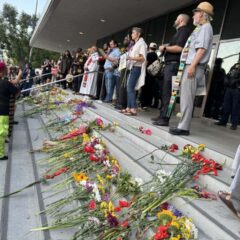This study examines the social impact of community service organizations that are affiliated with church groups in Southern California. In our work with many such faith-based groups, we have found that, while they all share a commitment to improving the lives of the people they serve, most do not collect data to measure the effectiveness of their programming. This is problematic for the following reasons:
- Funders increasingly demand evidence-based programming.
- There are no recognized standard measures for the community impact of faith-based
service groups. - Smaller faith-based service groups, particularly those in low-income neighborhoods, have difficulty creating the organizational structures and capacity to receive resources from funders.
- Funds typically go to large faith-based service groups that have name recognition and more organizational capacity, neglecting the important work done by smaller faith-based groups, especially in communities that are under-resourced.
Another key problem is that those faith-based groups that do collect evaluation and impact data tend to focus their data analysis primarily on inputs and outputs rather than outcomes (Lupton 2015). Examples of input and output measurements are:
- The amount of budget dollars devoted to a program;
- The number of staff devoted to a program;
- The number of participants/graduates in a program; and
- The number of people served (housed, fed, given clothing, etc.).
Examples of outcome measurements are:
- How did the lives of the participants improve?
- Were there changes in the behavior of the participants as a result of their participation?
- In what ways does the program improve the community in which it is located?
- In what ways has the organization improved in its capacity to fulfill its mission?
The measurement of outcomes in addition to inputs and outputs has several advantages as a gauge of a given program’s social impact (Lupton 2015). First, outcome-based measurements encourage programs to focus on tangible, achievable goals rather than sweeping general goals like “eliminating poverty” or “empowering the neighborhood.” Second, measuring outcomes allows the organization to evaluate whether it is achieving proposed goals, and therefore enables the organization to work to improve its impact over time. Third, outcome-based assessment creates accountability to those funding the organization, and thus increases the likelihood that a successful organization will continue to be funded in the future, ensuring greater organizational and programmatic stability.
In sum, the purpose of this case study is to explore ways of measuring the social impact of community-based organizations that can then be used to evaluate the effectiveness of a given organization’s programming. This will also enable the organization to show evidence to outside constituents and funders that the organization’s social impact goals are being realized.
Click here to download the report as a PDF
Brad Christerson is a contributing fellow with the Center for Religion and Civic Culture.





